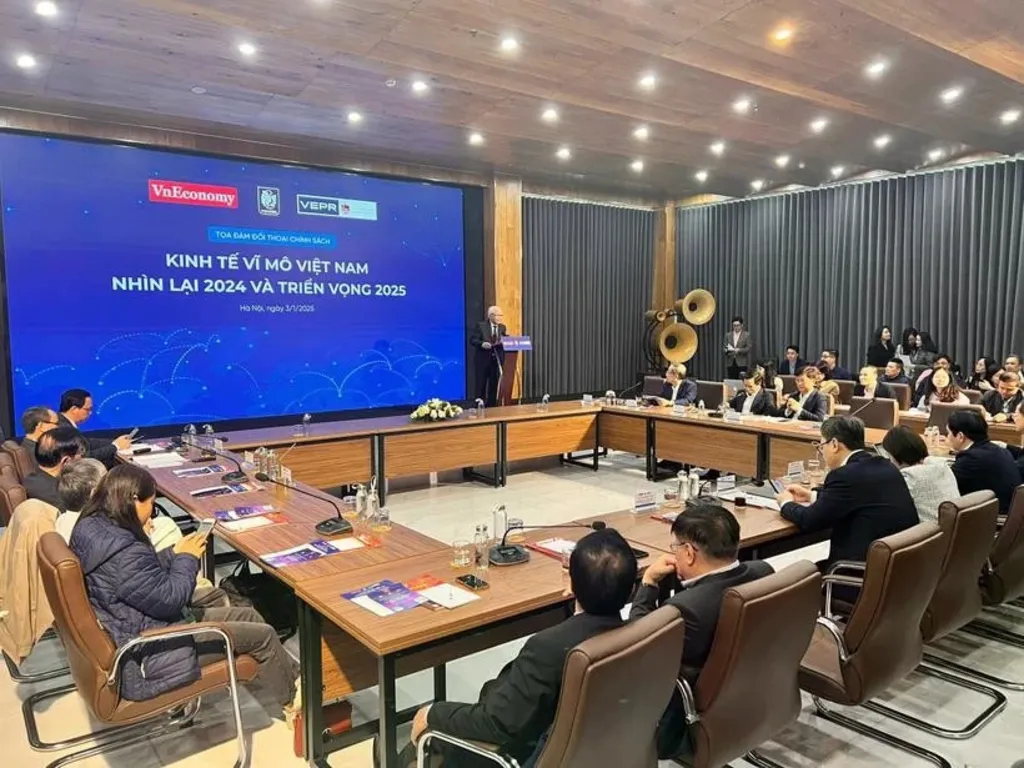 |
| An overview of the policy dialogue themed "Vietnam's Macroeconomy: Looking back at 2024 and prospects for 2025__Photo: Vietnamplus |
The global economic picture in 2025 is a panorama of contrasting colors: While major economies struggle to regain growth momentum, Vietnam is seen as a bright spot with positive growth prospects and is expected to reach 6.5 percent.
This information was unveiled at a policy dialogue themed "Vietnam's Macroeconomy: Looking Back at 2024 and Prospects for 2025" jointly held on January 3 by the Vietnam Institute for Economic and Policy Research (VEPR - University of Economics - Vietnam National University, Hanoi), the Vietnam Association of Small and Medium Enterprises (VINASME) and e-magazine VnEconomy.
Opportunities from challenges
At the event, economic experts provided in-depth analysis of the world economic context and its impacts on Vietnam, and discussed breakthrough solutions to help Vietnam "rise up" in the new era.
VEPR Deputy Director Nguyen Quoc Viet highlighted the positive outcomes in 2024 as seen in the rebound in demand, export value, foreign direct investment (FDI), and private sector investment. However, households spending remained weak, domestic consumption drivers such as accommodation and restaurant services rose by just 13 percent, tourism revenue up 17.3 percent, and public investment disbursement fell short of targets.
Despite challenges, the numbers of new businesses and those resuming operations grew even more strongly than the pre-COVID-19 period. Monetary supply growth continued to bounce back since the second half of 2024, he pointed out.
Forecasts for many indexes indicate a bright economic prospect for 2025, with GDP projected to expand 6.5 percent. Growth drivers like public and private investments and foreign trade remain robust. A weaker US dollar and lower US Federal Reserve interest rates are expected to benefit Vietnam's exports, especially to the US.
However, long-term risks such as climate change and rapid population aging threaten macroeconomic stability, Viet noted. He emphasized the need to stay focused on keeping macro-economic stability in tandem with boosting growth recovery. He also stated the importance of issuing well-planned policies to ensure businesses are resilient against policy shocks, alongside fostering sustainable development by promoting new growth models like green, digital, and circular economies.
In the medium term, it is important to upgrade infrastructure, improve workforce capabilities and skills, develop science and technology to enhance competitiveness, and facilitate innovative and sustainable business practices. In the long run, he suggested building and implementing focus-driven development policies while ensuring efficient public investment disbursement.
Viet also forecast the global economy in 2025 will face escalating geopolitical tensions, rising trade protectionism and increasingly severe climate change causing instability that could increase inflation and restrain global economic growth.
Staying vigilant amid headwinds
Despite many positive prospects, Vietnam's economy is still forecast to face many difficulties and challenges in 2025.
Economist Dr. Can Van Luc said global economic growth is expected to slow in 2024-2025 compared to the pre-pandemic period, while inflation, although decreasing, remains high, posing risks to public and private debt.
In addition, Luc also noted other unstable factors such as fluctuations in world oil and commodity prices, exchange rate fluctuations, geopolitical conflicts, trade and technology wars.
To overcome these challenges and effectively exploit development opportunities, he stressed the importance of addressing the trade deficit in services, accelerating public investment disbursement, and fostering private investment.
He also highlighted the need for effectively stimulating consumer demand, and fueling new growth drivers such as digital transformation, science - technology, and institutional reforms.
Luc called for decisive reforms and improved transparency in lawmaking, as well as a stronger focus on national database management to serve digital transformation. Coordinated fiscal, monetary, and pricing policies will be crucial to coping with external risks. Growth quality also needs to be ensured through productivity and capital efficiency improvements.
Experts emphasized that Vietnam needs to proactively adapt to the changing international context, making the most of opportunities from new-generation free trade agreements (FTAs), thereby improving competitiveness and promoting international economic integration.
With a new mindset, strategic vision and strong determination to act, according to experts, Vietnam can completely overcome challenges, seize new opportunities and firmly take steps down the path of prosperous development.- (VNA/VLLF)









